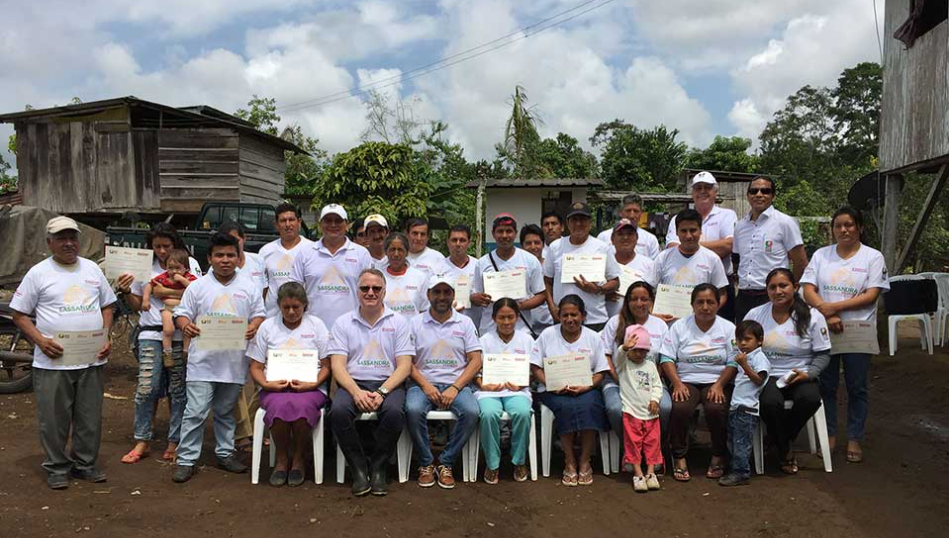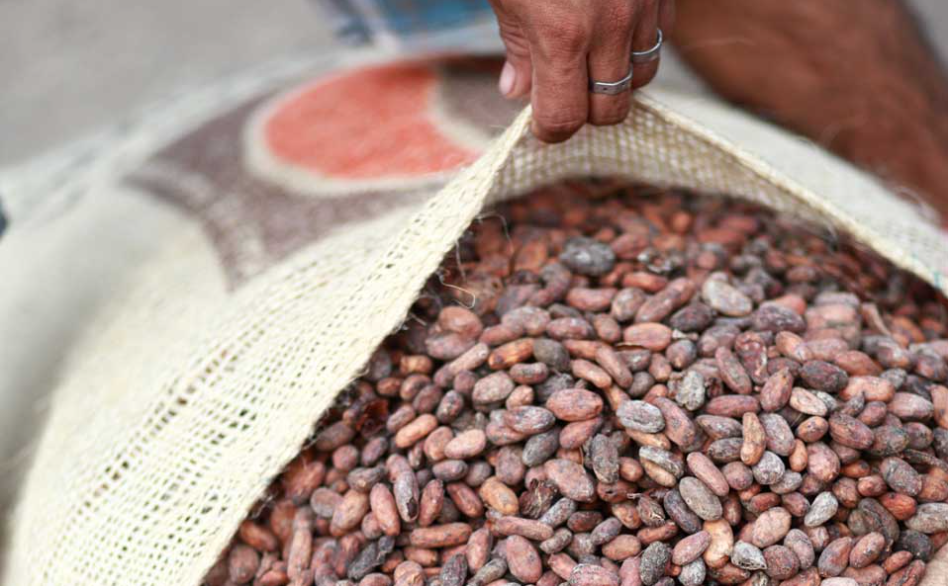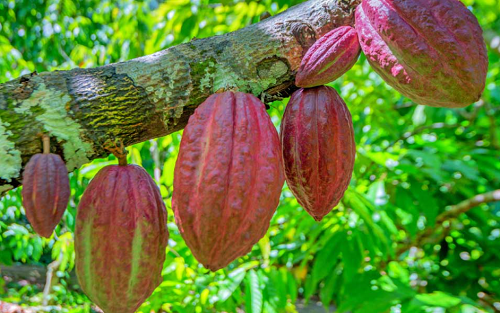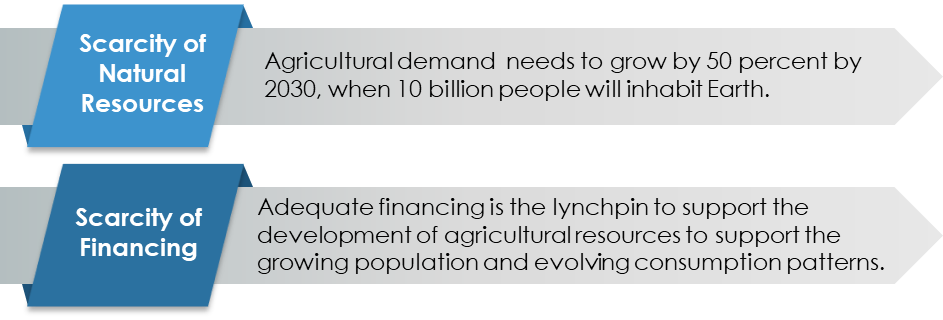Compartir


Liquidado por el promotor
Ecuadorian Cocoa Farming IV
Guayas Province, EC
pagos
semestral
plazo
6 months
interés anual
4.5%
rating riesgo
B+
Fondo de maniobra para empresas familiares de productores de cacao.
Descripción
Working Capital Associates es una empresa que financia cadenas de valor agrícolas en África subsahariana y América Latina. Hasta la fecha, la empresa ha recaudado 1.050.000 euros a través de Goparity para financiar varias organizaciones: una cooperativa de café en Perú (Agricultura Peruana Resiliente y II); una empresa de cacao en Perú que agrupa a pequeños productores (Cacao Orgánico Perú, II, III y IV); y una empresa familiar de cacao en Ecuador (Cacao Ecuador, II y III).
Esta es la décima campaña de la WCA con GoParity. Cinco de estas nueve campañas (por un importe total de 500.000 euros prestados) ya han alcanzado con éxito el vencimiento de su plan de reembolso. Todos los inversores han recibido la totalidad del capital invertido y los intereses.
El objetivo de esta campaña es financiar una empresa familiar con sede en la zona costera de la provincia de Guayas, en Ecuador. La empresa está especializada en la agregación, transformación y venta de cacao en grano convencional y productos como licor, manteca y cacao en polvo a Europa y Norteamérica. Los fondos recaudados a través de esta campaña se utilizarán como capital transaccional para proporcionar a la empresa liquidez para diversas etapas, desde la adquisición y el procesamiento hasta la exportación.
 La empresa fue creada en 1996 por un empresario local y se ha convertido en uno de los principales exportadores nacionales de cacao fino aromatizado, así como de chocolates y especialidades gourmet semipremium y premium, gracias al control de todo el proceso industrial y a la identificación de los orígenes geográficos más representativos del cacao fino aromatizado en Ecuador.
La empresa fue creada en 1996 por un empresario local y se ha convertido en uno de los principales exportadores nacionales de cacao fino aromatizado, así como de chocolates y especialidades gourmet semipremium y premium, gracias al control de todo el proceso industrial y a la identificación de los orígenes geográficos más representativos del cacao fino aromatizado en Ecuador.
Con dos plantas ubicadas en las provincias de Guayas y Los Ríos, la empresa tiene una capacidad total de exportación de 20.000MT al año. Existe una creciente competitividad en el mercado, vinculada a la presencia de multinacionales y a la proliferación de empresas locales. Con el objetivo de ser más eficaz y competitiva, la empresa ha decidido invertir en la automatización de las operaciones, la mecanización y la diversificación de los productos, habiendo desarrollado ya un proyecto innovador de automatización de las operaciones con maquinaria de alta tecnología fabricada especialmente para el sector del cacao.
Según la empresa, estas innovaciones tecnológicas han logrado los siguientes resultados
Duplicación de los volúmenes de producción y exportación.
Reducción de los riesgos laborales.
Reducción del tiempo de preparación de los lotes.
Mejora y garantía de la homogeneidad y calidad del cacao.
Reducción del porcentaje de errores humanos en todas las fases de producción.
Control de los costes de producción.
Garantizar una mayor calidad.
Además, la empresa ha automatizado totalmente la fábrica, lo que permite gestionar todos los procesos desde un ordenador, portátil o tableta.

La misión de la empresa es exportar al mundo los mejores granos de cacao fino ecuatoriano y sus derivados, promoviendo el comercio justo con pequeños productores y comercializadores, e integrando toda la cadena productiva del cacao agrícola con los mercados internacionales, garantizando altos estándares de calidad, responsabilidad por los recursos humanos y cuidado del medio ambiente.
Según la dirección, la empresa ha establecido un sistema de seguimiento que garantiza la información sobre la trazabilidad del cacao en cada uno de sus procesos, desde la producción, la manipulación post-cosecha y la distribución del cacao, con el fin de mantener un registro del cacao hasta la entrega final al consumidor.
Los productos proceden de 2.500 productores de cacao y la organización se centra en mejorar su productividad y los controles de calidad a través de dos programas de patrocinio privado que benefician a 5.000 familias.
1. Un Programa basado en la Calidad, la Trazabilidad y la Sostenibilidad que ofrece a las comunidades agrícolas los siguientes servicios:
- Asistencia técnica y formación para mejorar la productividad.
- Asesoramiento y apoyo para mejorar la calidad y la poscosecha.
- Formación para desarrollar las capacidades de gestión, financieras y comerciales de las comunidades.
- Prácticas de comercio justo para mejorar la calidad de vida de las comunidades.
El objetivo es establecer un sistema de seguimiento que garantice la trazabilidad del cacao en grano en cada uno de los procesos, desde la producción hasta la manipulación postcosecha y la distribución. En este programa, la empresa trabaja con un grupo de asociaciones de pequeños productores.
2. Proyecto sostenible destinado a mejorar la productividad de los pequeños productores de cacao y mejorar su calidad de vida, utilizando instrumentos como la capacitación técnica y la dotación de herramientas agrícolas. El objetivo principal del programa es obtener un grano de cacao fino, con menos grasa y más sabor, bajo el patrocinio del Gobierno de Sucumbíos (Región del Cacao) y en coordinación con las asociaciones de pequeños agricultores. Hasta la fecha, 680 productores de cacao se han inscrito en el programa.
Ecuador es el segundo productor de cacao de América Latina, después de Brasil, y ha sido reconocido como el mayor productor de cacao fino del mundo.
Existen dos categorías generales de cacao en grano en el mundo: el «cacao fino o de aroma» y el «cacao a granel». La producción de cacao fino representa menos del 5% de la producción anual mundial de granos de cacao, y Ecuador es el mayor productor de granos finos, responsable de más de la mitad de la producción mundial de esta materia prima necesaria para las industrias europeas y estadounidenses del chocolate fino. Los datos de Ecuador sugieren que la prima del cacao sobre el precio de los granos de cacao fino o aromatizado en la Bolsa de Nueva York se sitúa entre el 20% y el 30%.
Al final del año agrícola 2020/21, el volumen total de cacao en grano clasificado en ICE Futures U.S. alcanzó un máximo de 109.599 toneladas de cacao en grano, en comparación con las 25.679 toneladas clasificadas durante el mismo período del año cacaotero anterior, con volúmenes de cacao en grano de Ecuador en las clasificaciones de ICE Futures U.S. que alcanzaron las 18.383 toneladas.
En Ecuador, unas 360.000 hectáreas de cacao son cultivadas por unos 90.000 agricultores. La mayoría de estos agricultores viven en la pobreza y operan en menos de 10 hectáreas de tierra (según representantes de ONG en Ecuador). Sus ingresos dependen en gran medida de la producción agrícola, de la que casi la mitad procede de la venta de cacao en grano. El 85% de la producción de cacao tiene lugar en la región de la llanura costera de Ecuador.

El impacto
This is the fourth campaign aimed at providing working capital for the same female-owned company of small cocoa producers in Peru. This is the direct impact of these campaigns:
- Promotion of an inclusive value chain by joining 2.500 local producers who have access to an international export value chain.
- Better working and financial conditions for small producers, who own less than two hectares of land.
- Rural poverty reduction: smallholders will receive a higher profit margin for their produce, which can be allocated to more than pure subsistence.
- Contribution to the Company’s social mission, by ensuring cash payments at the “farm gate” to the farmers and early payments at a premium to the Company. The Company can then reinvest the money in training, education, social support to the farmers and their families, health support and help with organic and fair-trade certifications.
- Incentive to organic product growth: all the cocoa produced is organic and certified by a third party.
- Incentive to reducing child slavery: the chocolate certification guarantees that all the processing and procurement is free of child slave labor, and there is no tolerance for any abusive labor practices.
- Contribution to environmental protection: the Ecuatorian focus on pruning cacao trees, aims to help farmers make the most of what they already had, so they wouldn’t need to press further into the Amazon. Among other sustainable techniques are shade-growing and multi-cropping, as well as the correct use of fertilizer and pesticides, including natural pest control and compost.
Impact Indicators

1.027
Personas impactadas
Contribución a los Objetivos
de Desarrollo Sostenible
Objetivos de Desarrollo Sostenible
.359d24f.png)
.d617453.png)
.1830098.png)
Viabilidad Financiera
Los fondos recaudados a través de esta campaña se utilizarán como capital de trabajo transaccional, garantizando liquidez a la empresa desde la fase de adquisición hasta la fase de procesamiento y exportación.
El capital circulante resuelve este problema, con las siguientes ventajas:
- Liquidez para la compra de materia prima: el productor pasa a tener la capacidad de comprar materia prima para responder a nuevos pedidos de compra, sin tener que esperar el pago de los compradores actuales, lo que le permite hacer crecer su negocio.
- Precios más altos: al eliminar la presión de la liquidez, los productores dejan de estar obligados a ofrecer descuentos a los compradores a cambio de pago anticipado, recibiendo un precio más elevado por el cacao certificado, que refleja su valor real.
- Mayor margen de beneficio que puede ser reinvertido: con un mayor margen de beneficio, este dinero no solo garantiza la estabilidad financiera de los productores, sino que también puede ser utilizado para invertir en formación y capacitación, así como en los costos de certificación de producción orgánica y comercio justo.
WCA tiene un Seguro de Crédito Comercial otorgado por una aseguradora global que opera en más de 50 países. El pago está garantizado por esta póliza, que protege a los inversores de GoParity en caso de incumplimiento (por ejemplo, insolvencia). Las coberturas de la póliza incluyen pérdidas en caso de insolvencia, morosidad prolongada y riesgo político hasta el 90% del valor de la transacción comercial que es financiada por WCA. Dado que WCA financia un máximo del 80% de cualquier transacción, la póliza en su esencia cubre más que el financiamiento global de WCA.
Download Información Financiera para el Inversor de Financiación Colaborativa (IFIFC)
El Promotor
Sobre WCA (Working Capital Associates) LLP
Working Capital Associates (WCA) se fundó en 2018 por Federica Sambiase – profesional senior del sector financiero y bancario – y CEO de la empresa. Experimentó de primera mano como los bancos comerciales tradicionales no conseguían adaptarse a las necesidades de los prestatarios de PYMES y sus requisitos hechos a medida, especialmente en regiones como SSA y Latam, donde la necesidad de crédito crecía rápidamente.
La visión de WCA refleja más de 20 años de experiencia de su líder en el mundo de las finanzas, así como la pasión por el desarrollo e igualdad de género, madurada y nutrida durante sus años como miembro de la junta directiva de la ONG Care International.
WCA es la única empresa – liderada por mujeres y cuya propiedad es totalmente femenina- que proporciona financiación directa a la cadena de valor de productos agrícolas en África subsahariana (SSA) y Latinoamérica (Latam).
WCA está comprometida con un enfoque de negocio profesional, ético y transparente, efectuando inversiones socialmente responsables “que permiten a los inversores abordar los criterios medioambientales, sociales y de gobernanza empresarial (ASG) mediante la inversión en soluciones específicas, como por ejemplo la energía renovable, gestión de residuos y agua, silvicultura y agricultura, productos de salud e inclusión financiera ” (PRI).
La empresa sigue dos cuestiones clave:

La empresa también aplica inversión en lentes de género, procurando financiar un nivel significativo de negocios liderados por mujeres que siguen los estándares de gestión sostenible y responsable.
El propósito de WCA es aumentar la cadena de valor proporcionando acceso a financiación a PYMES y enfocándose en tres principios clave dentro del marco de los ODS:
- ODS 2 – Hambre 0 y seguridad alimentaria, promocionando agricultura sostenible.
- ODS 12 – Asegurar la producción y consumo responsables.
- ODS 8 – Promocionar trabajo decente y crecimiento económico.
El equipo está compuesto por diez profesionales, gran parte del equipo miembros senior con más de 10 años de experiencia en mercados emergentes y/u operaciones financieras, y experiencia colectiva en financiación de más de 1 billón de dólares de deuda a corto plazo y transacciones comerciales de mercados emergentes.
Puedes saber más sobre el equipo aquí.
WCA también ha sido reconocido como un agente del mercado relevante, y como prueba de ello:
- Asociación con Centro de Comercio Internacional de las Naciones Unidas, en el ámbito de apoyo comercial de actividades enfocadas de género.
- Asociación con la Cámara de Comercio de Kenia.
- Conferenciante en el Foro Mundial de Comercio y Desarrollo - Etiopía
- Conferenciante en la Semana Sostenible de Suiza.
- Conferenciante de la Cumbre Anual de Café de África del Este – Kenia.
- Formador y colaborador en seminarios con la Cámara de Comercio de Kenia y del Centro de Comercio Internacional.
El equipo
Gathuo Njoroge es un experto en finanzas y tecnología con más de 10 años de experiencia en desarrollo de productos, investigación, originación y operaciones de soluciones financieras para PYMEs y corporaciones en los mercados de África Oriental y Estados Unidos.
Ekaterina Kobzareva es una profesional de inversiones experimentada y altamente calificada, con más de 6 años de experiencia en análisis financiero, diligencia debida y estructuración de acuerdos (tanto del lado comprador como vendedor) en diversas industrias.
Modelo de negocio
WCA tiene su sede en Londres y está registrado desde 2017 en la FCA bajo la regulación de blanqueamiento de capitales, financiamiento terrorista y transferencia de fondos. La empresa opera mediante un modelo de empresa financiera comercial recogiendo fondos (en forma de préstamos y/o co-inversiones que provienen normalmente de fondos de impacto institucionales, Instituciones de Desarrollo Financiero (DFIs), y patrimonios privados) y después prestándolos a proyectos en países emergentes. Los ingresos de la empresa provienen del margen de interés neto entre el interés de los prestatarios y el interés pagado por los prestamistas.
El público objetivo de la empresa engloba 2 millones de PYMES con limitaciones financieras (#1.6 millones en África y #0.4 millones en Latam). Concretamente, la empresa tiene como mercado objetivo Perú, Costa Rica, Colombia, Ecuador, Kenia, Ruanda, Tanzania y Etiopia, y preferentemente en la cadena de valor del sector alimentario.
La empresa ha adaptado sus servicios para las PYMES, las más vulnerables a las exigencias de financiamiento transaccional – aproximadamente el 58% de las propuestas de transacciones financieras son rechazadas por los bancos, a pesar de que a nivel global este sector presenta el 44% de todas las propuestas de transacción financiera-. Los bancos rechazan gran parte de las propuestas por tres principales razones: los reguladores imponen requisitos muy engorrosos de AML (prevención blanqueo de capital) y KYC (conocimiento del cliente), requisitos de capital para financiamiento a corto plazo inviables o poco rentables para empresas con baja calificación y limitación de capital bancario.
WCA sigue sus propios principios de inversión responsable basado en los 10 Principios del Pacto Mundial de la ONU.
Activo desde
2018
Pais fiscal
GB
Operando en
"Latin America and Sub Saharan Africa"
Industria
Inversiones
Número de préstamos Goparity
23
Empresas promotoras con mujeres accionistas
Si
Novedades
2022-06-07
Primer pago
El primer pago se pagó a todos los inversores
2021-12-07
100% financiado
741 inversores recaudaron con éxito 150.000€
2021-12-01
Abierto a la inversión
Esta campaña está abierta a la inversión
Suscríbete a nuestra newsletter para estar actualizado sobre nuestras oportunidades de inversión.






